Natural Indoor Moth Repellant: Learn About Herbs That Drive Away Moths


Growing herbs is easy and rewarding. They smell great, and you can harvest them for cooking. Another great benefit is that you can actually deter moths with herbs indoors. Your very own dried herbs are great alternatives to toxic, stinky mothballs and will help you keep moths out of the house and away from your clothing and linens.
Growing Herbs to Repel Moths
Herbs are very easy to grow. They take to containers easily and can be grown indoors if you have a nice, sunny or partially sunny window to place them near. To use these herbs as a natural indoor moth repellant, grow a couple pots worth and when mature, harvest the herbs to dry. Create sachets using loose-leaf tea bags, cheesecloth, or another type of breathable fabric bag. Place the sachets throughout your vulnerable fabrics to keep moths away. Alternatively, you can sprinkle the dried herbs in your drawers or on closet shelves instead of making sachets.
Herbs That Drive Away Moths
While a number of herb plants may work, a couple of simple and easy-to-grow herbs that make great indoor herbal moth repellants are lavender and spearmint. Lavender has a beautiful smell that most people enjoy, although some may find it a little medicinal. Moths do not like the smell, so dried lavender is a great indoor herbal moth repellant. Grow lavender in pots in your sunniest spots, including by doorways and windows where you think pests like moths may be getting in the house. Spearmint is also a natural indoor moth repellant and another herb that smells great and is easy to grow. Most types of mint are extremely easy to grow. This is a hands-off herb that will only need you to water it regularly and it will thrive and spread quickly. To deter moths with herbs is pretty simple but be aware that these herbs will not kill moths or their eggs. Before you use them in your closet or drawers, do a thorough cleaning to ensure you don’t have any eggs that could hatch later.
Gardening tips, videos, info and more delivered right to your inbox!
Sign up for the Gardening Know How newsletter today and receive a free copy of our e-book "How to Grow Delicious Tomatoes".

Mary Ellen Ellis has been gardening for over 20 years. With degrees in Chemistry and Biology, Mary Ellen's specialties are flowers, native plants, and herbs.
-
 Looking For Plants To Give You The Soft And Fuzzies? Try These 5 Fuzzy Leaf Plant Options
Looking For Plants To Give You The Soft And Fuzzies? Try These 5 Fuzzy Leaf Plant OptionsLovers of texture, drama, silver foliage and tactile plants will adore these special sensory garden additions. These fuzzy leaf plant options will leave you all aglow
By Susan Albert
-
 Get Ready For A Summer Of Hummers! Grow These Full Sun Hummingbird Plants and Flowers
Get Ready For A Summer Of Hummers! Grow These Full Sun Hummingbird Plants and FlowersIf you’re lucky enough to enjoy a sunny backyard, make sure you are maxing out on your pollinator opportunities and grow these full sun hummingbird plants and flowers
By Tonya Barnett